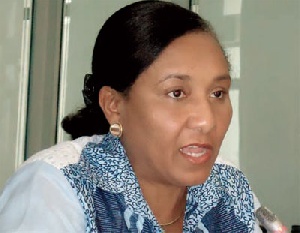 Mona Quartey, Deputy Minister of Finance
Mona Quartey, Deputy Minister of Finance
A Director at the Public Investment Division of the Ministry of Finance has stated that Public Private Partnerships (PPPs) could help close the development gap of the country in view of the huge pressure on the national budget.
Magdalene Apenteng said that there is current shortfall in the provision of infrastructure and the government continuously borrows to execute massive projects as a result.
Engaging the PPPs in that direction would help to reduce Ghana’s borrowing, he said.
The director was speaking at a forum yesterday on PPPs organized by the Public Investment Division of the Ministry for Civil Society Organizations (CSOs) under the theme: ‘Leveraging PPPs for accelerated development – role of civil society organizations.’
She said that the ministry had designed a platform to create awareness, improve knowledge and understanding on PPPs and highlight advocacy on a national level.
She said that PPPs are long-term contractual partnership arrangements between private and state institutions to develop public infrastructure and services.
“PPPs are becoming increasingly important in emerging countries like Ghana as a development instrument. The underlying principle is that it would bring together public and private entities to design, finance, build and manage public infrastructure and services,” Mrs. Apenteng added.
She said the government is focusing on water supply, sanitation, public transportation, telecoms and certain aspects of education and health delivery for the PPPs.
She also said that civil society organizations were being encouraged to get involved in the arrangements because “they are important development and policy-making processes of countries as they provide expert knowledge on many issues extending their influence to all levels of society, including the executive and legislature.”
A representative of Deputy Minister of Finance Mona Quartey said the government singlehandedly cannot finance infrastructural development within a short period and called on the private sector to get involved.
She said for instance that the government needed to generate at least $307 million annually for the transportation sector, $435 million for the water sector, $1.2 billion for the power sector and at the same time bridge the housing deficit by building about 170,000 units annually for a period of 10 years.
Isaac Oware-Aboagye, who is the project coordinator at the Public Investment Division at the Ministry, said that in the PPP arrangement, the private sector party performs part or all of a government service delivery functions and assume the associated risks for a significant period.
Prof Philip Duku Osei, Deputy Rector at GIMPA, who chaired the forum, said that PPPs have always been one of the tools for public sector reforms.
He said “the public’s active participation in the PPPs is crucial if we are to ensure successful execution of infrastructural projects and the provision of services.”